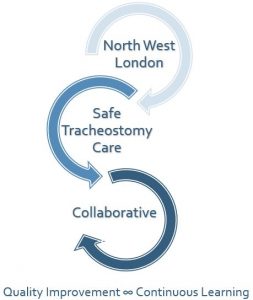There are four key enablers that were fundamental to successful and timely delivery of this remarkable portfolio of work:
- Ownership & prioritisation – In the first instance the program secured prioritisation from Trust MDs and NWL Critical care Network which helped to elicit and secure interest from multidisciplinary teams (MDT) across 7 Trusts (12 hospitals). MDTs recognised the added value of this program and embraced the opportunity to locally shape and work on collective priorities that were in needed of improving and important to them.
- Hearts & minds – Through active engagement ICHP helped to bring together an enthusiastic and expert group of over 40 clinicians who took on leading roles and committed to delivery across the three workstreams despite tight timescales and juggling other demands and clinical commitments. As a result, new relationships have been fostered across sites which facilitate sharing of good practice and working through joint challenges. Patient perspectives sat at the heart and drove improvements.
- Centrally coordinated-locally led model – Improvement initiatives require building in time, clarity and systems to facilitate successful implementation. ICHP played a key stewardship role which helped to centrally support time-pressured clinicians by establishing a streamlined communication pathway, setting up an agile delivery approach, providing clarity on key steps and milestones. This centrally coordinated-locally led model helped to bring about a structured, engaging, uncomplicated and achievable an approach to improvement.
- Build in sustainability at the start – Embedding good practice into ‘business as usual’ is a key success marker of an improvement program. Sustainability was built in early through Trust ownership of the program, appointing a clinical Chair to lead meetings and multidisciplinary teams taking the lead on all three priorities. Cross-site and MDT approach to collaboration established through NWL STCC will be sustained to keep resources produced up to date, share good practice and identify new priorities for joint action.
As a result, MDTs across NWL Trusts have strengthened their approach to provision of safe, standardised and continuity of care for patients with a tracheostomy and are optimally equipped for a surge response. Learning and resources have secured interest across London and nationally and have been shared via London Transformation and Learning Collaborative and the AHSN network.



